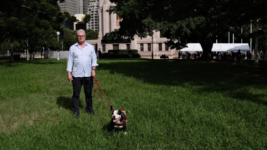McBride to Argue Public Interest Defence Next Week, Under Flawed Laws

Former ADF lawyer David McBride is set to appear before the ACT Supreme Court on 27 October, as his public interest disclosure defence hearings commence, under legislation that federal attorney general Mark Dreyfus drafted himself, and now admits is problematic and needs an overhaul.
When McBride was deployed to Afghanistan to serve two tours as a military legal advisor, in 2011 and 2013, he was, in his own words, “a true believer”, who thought the Australian government “must be doing the right thing”.
However, what he saw on the ground in the Central Asian country, changed his mind, as he asserts our government wasn’t following the law, or attempting to win any conflict, but rather, in this “Instagram war”, the ADF was only concerned with keeping up appearances.
Following his return from his second tour, the lawyer, who was formerly a captain in Britain’s Special Air Service, went to his ADF superiors, as per the stipulations of the Public Interest Defence Act 2013 (Cth), with his concerns about how our nation was operating in Afghanistan.
After Australian Defence Force management refused to act on his complaint, he then, as per PID protocol, went to the press, specifically the ABC, with classified information that formed the 2017 Afghan Files report.
However, as McBride has told Sydney Criminal Lawyers in the past, whilst the media focused on the war crimes of the special forces foot soldiers, what he was trying to expose was how the military higherups were running the show with no regard for regular troops.
Shotting the messenger
Dreyfus drafted the PID Act in 2013, during a short stint as AG in the Rudd government. Then, the statutorily required Moss inquiry into the legislation delivered its 2016 report with 33 recommendations to improve it that successive Coalition governments simply ignored.
In the lead up to last May’s election, Dreyfus promised to overhaul the PID Act, which is a pledge he continues to plan to keep now that he’s the nation’s chief lawmaker once more.
The current AG also inherited three controversial whistleblower prosecutions, launched by former attorney general Christian Porter, that many assert to be political in nature, as they served no public interest, but rather appeared to be revenge actions to punish the subject for speaking out.
The prosecution of ACT barrister Bernard Collaery was promptly dropped by Dreyfus on taking office, but the case against McBride and ATO whistleblower Richard Boyle continue, despite the AG being able to drop them under the power contained in section 71 of the Judiciary Act 2013 (Cth).
In a recent reply letter to the Alliance Against Political Prosecutions, Dreyfus told the supporter group that the section 71 power is “reserved for very unusual and exceptional circumstances”, which he obviously doesn’t consider these cases to be.
And the AG further added that whether the PID Act immunities will support these men’s cases is up to the courts, even though he’s admitted the laws are flawed.
Shattered aspirations
A stark aspect to McBride’s case is that the four-year-long Brereton inquiry into Australian war crimes in Afghanistan, commenced a year prior to the publishing of The Afghan Files and delivered its final report two years after five national security-related charges were laid against the lawyer.
The November 2020 released Brereton report recommended the AFP investigate 36 matters as potential war crimes, which relate to 23 credible incidents, involving 19 Australian troops.
Yet, two years later, McBride, the whistleblower, remains the only person charged in relation to any of these matters.
“I did exactly what I was trained to do. And the idea that it was all a charade and you weren’t meant to point out wrongdoing when you saw it… is against everything that my grandfather’s era fought for,” McBride said during an SCL interview in April last year.
“Unless we can stop the trajectory, we will become a more or less totalitarian regime with a sunny climate,” the lawyer added.
And it seems that even with a new government elected, which has since been spruiking its rights-forward intentions, the nation remains on the same course McBride has warned us of.







